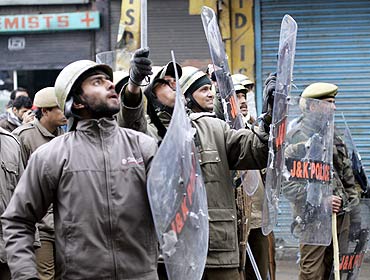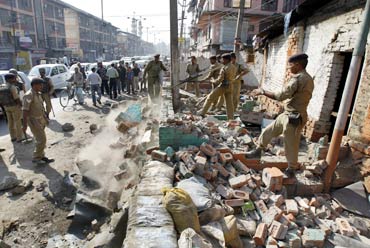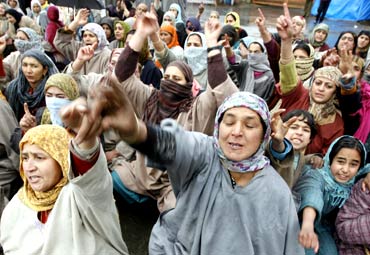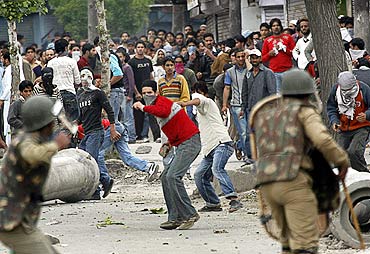Photographs: Fayaz Kabli/Reuters
In the first part of his interview with rediff.com's Aziz Haniffa, veteran diplomat Howard B Schaffer explained why the situation in Kashmir had worsened. New Delhi continued to be in denial while Islamabad was tempted to stoke the fires, said Schaffer, author of The Limits of Influence: America's Role in Kashmir and a much sought after expert in think tank circles.
In the second part of the interview, Schaffer pinpoints the reasons behind the United States's reluctance to get involved in the Kashmir imbroglio, and the changing hues of the insurgency in the Valley.
Part I: Kashmir: 'It's a dangerous situation for India'
Why is the United States so particular in not talking about the situation in Kashmir?
The US's options are very limited at this point. Also, any public effort to admonish the Indians -- to call on them to deal effectively and democratically with the Kashmiris -- would very much be resented in India at this time. This is a sensitive time and it would be embarrassing and particularly in the run-up to (US President Barack) Obama's visit.
In fact, when you talk about the US being scrupulously silent on this issue, I had a student assistant check through all of the White House, State Department briefings, and the only thing that we could come up with in all the time of more than four months of (since) the outbreak began was (Under Secretary of State) Bill Burns, in which he took the position as usual that it's too bad that this is happening and the two sides should work together, but that this is an internal Indian matter.
And, as I was suggesting before, the fact that a visit by the President of the United States is going to take place in about five weeks, it's certainly something that has influenced the way the US has spoken about this because they don't want to spoil the trip. And a comment on Kashmir, however innocuous, if they go much beyond what Bill Burns said, could affect aversely from the US point of view and vitiate the atmosphere of the talks in Delhi.
Now, by the same token, you would think on the other side, the Pakistanis would want to play this up so as to create a sense that the world should become involved again in Kashmir. This has been going on from the very start. The Pakistanis have sought always to internationalise the issue while the Indians have consistently wanted it to be dealt on a bilateral basis, where, of course, they would have the advantage as the stronger country and as the status quo power.
'Obama will stick to the line that this is an internal Indian matter'
Image: Policemen demolish their security posts in the heart of SrinagarPhotographs: Fayaz Kabli/Reuters
I guess especially with President Obama's visit to India in a few weeks, the Pakistanis would see the utility in redoubling their efforts to play up the Kashmir situation and try to make the argument that this should be on the agenda, etc?
Absolutely, and I've heard it said -- the fact that Obama's visit to India incentivises those who want to see action on Kashmir.
Do you think that Obama during his visit will bring up the situation in Kashmir or do you believe he will scrupulously eschew any mention on Kashmir?
I don't believe he will bring it up in any serious way, and certainly not in public. He is likely in his discussions with the Indian leadership to take very much the same position that Bill Burns took recently. There may be an expression of sympathy and that we hope that you will be able to deal with this and that we hope that you will be able to re-enter your dialogue with the Pakistanis, covering all matters including Kashmir. But, basically, Obama will stick to the line that this is an internal Indian matter.
So whatever Obama may have said during the presidential campaign in his famous interview with Time about the importance of India resolving the Kashmir situation has now been replaced by a realisation as to how overly sensitive India is to any international involvement -- least of all by the US -- in the Kashmir conflict?
The Time magazine interview happened very early on and we can certainly trace it as far back as our decision not to press the issue of (Richard) Holbrooke becoming involved in India-Pakistan affairs -- that his mandate would be confined to Afghanistan and Pakistan and would have nothing to do with India, hence would have nothing to do with Kashmir. And, the administration has stuck to that. As a result, what Obama said to Joe Klein in that famous interview -- that position has been abandoned.
'This could lead to a confrontation between India, Pak'
Image: Kashmiri women demonstrate against the security forcesPhotographs: Danish Ismail/Reuters
Bruce Riedel recently wrote that the Kashmir imbroglio is more dangerous than the situation in Afghanistan. That Obama must secure a deal on Kashmir because at stake is another India-Pakistan confrontation with nuclear potential, which the jihadis are only too eager to provoke. Do you subscribe to Bruce's contention?
I certainly think that Islamic sentiments, Islamic extremism has very much grown in Kashmir over the past 20 years -- that Kashmiri nationalism remains important -- but surely as compared with the situation in 1990, and you had asked me to compare that, Islamic sentiment now is more important than it was then. So, it's a dangerous situation because as I said earlier, it could lead to a confrontation between India and Pakistan.
As so many have said, including Bruce, and I will also say, this could lead to an escalation up to the point of a nuclear exchange. Now, the situation becomes even worse when you consider the dire straits Pakistan is in.
So, aside from what I said before about not wanting to embarrass India and undercut the talks at a period when the Kashmiri issue is so sensitive for the Government of India and for the Indian public, the other thing to consider is that the Pakistani government in its present state is in no position to enter into meaningful discussions of Kashmir because any sort of move towards a settlement will involve significant concessions on the part of the Pakistanis.
This government of Pakistan is too weak to initiate such concessions, nor would these concessions, it seems to me, have the support of the Pakistan army, which is becoming an increasingly important element in the governance of the country.
'The Indians were prepared to take very strong measures'
Image: A young Jamaat-e-Islami supporter with a toy gun at a protest in SrinagarPhotographs: Mohsin Raza/Reuters
You spoke of Kashmiri nationalism having been replaced over the years by Islamic militancy. What brought this on?
Back in 1990, the people in Kashmir were emboldened by world developments. The Cold War had just ended, new Muslim States were emerging in Central Asia, Yugoslavia had been broken up as the Soviet Union had been. Islam came to be on the march. The Communists and the Soviets had been defeated or forced to withdraw in Afghanistan. There was a real sense of hope that things were changing and that Kashmir could be changed too. That if the Soviets could be defeated in Afghanistan, the Indians could be beaten in Kashmir. It was proved that this wasn't the case at all. The Indians were prepared to take very strong measures to stop that. Now, it seems to me it's more of a sense of desperation.
When you spoke of the possibility of India-Pakistan confrontation, I presume the fact that Mumbai still remains very raw in the Indian public psyche adds to the mix?
Of course it does. And, I am quite sure that were there to be another significant extremist attack which could be traced back to Pakistan, there could be enormous problems in Kashmir as well.
India's National Security Adviser Shiv Shankar Menon the other day rubbished the contention of a growing body of thought in Washington that if the Kashmir situation is resolved it would remove a major reason for the existence of the jihadi network in Pakistan. Do you agree with him?
He was absolutely right. That contention of a linkage is difficult to maintain.
'The Indian government's task is more difficult now'
Image: Policemen and Kashmiri protesters face offPhotographs: Fayaz Kabli/Reuters
Why is it that this perception is now gaining currency, particularly in Pentagon circles? Is it because of the closeness now of the Pentagon brass and the Pakistani military leadership in fighting this so-called war on terror?
I just can't speculate about that. I haven't talked to any military officers about the basis for this contention. But getting back to the original issue, it's easy enough to talk, but what is needed now is sustained action because, as I said earlier, there is a tendency on the part of the Indians to go into denial. They deny that anything really is happening or they blame it on the Pakistanis or on Islamic elements or on terrorists sponsored by Pakistan. And, then when they finally bring themselves to take some action, in the past this action has tended to be short-lived.
Once things begin to calm down, the Indians don't see any particular reason for making concessions and start saying there is no problem. The Kashmiris are well aware of this pattern. That's what makes the task of the Government of India more difficult now, because they (the Kashmiris) will have to be persuaded that they (Delhi) are taking action.






article